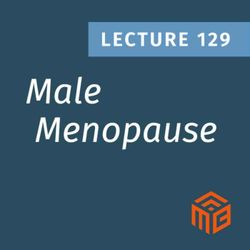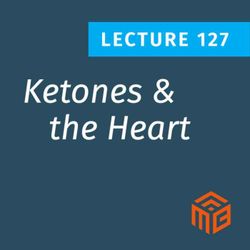Share

The Metabolic Classroom with Dr. Ben Bikman
The Metabolic Consequences of Poor Sleep
Learn more about becoming an Insider on our website: https://www.benbikman.com
Dr. Benjamin Bikman delves into the profound relationship between sleep and metabolic health, emphasizing the critical role sleep plays in maintaining insulin sensitivity and overall metabolic function.
Ben explains that deep sleep is a restorative phase during which the body repairs cells, regulates hormones, and improves insulin sensitivity. Poor sleep, however, disrupts these vital processes, leading to hormonal imbalances that elevate cortisol levels and reduce melatonin production.
Elevated cortisol, a stress hormone, promotes gluconeogenesis and insulin resistance, while insufficient melatonin—a hormone essential for regulating sleep—negatively impacts insulin sensitivity and glucose metabolism. This disruption creates a cycle of metabolic dysfunction, increasing the risk of conditions like type 2 diabetes and obesity.
Dr. Bikman highlights actionable strategies to improve both sleep and metabolic health. He stresses the importance of avoiding high-glycemic meals before bed, minimizing exposure to blue light from screens, and maintaining consistent sleep schedules.
He also discusses how ketones, especially in athletes after intense exercise, have been shown to improve sleep efficiency and REM sleep duration.
For individuals struggling with sleep, Dr. Bikman explores the potential benefits of melatonin supplementation and exogenous ketones, underscoring the need for personalized approaches. By addressing evening habits and understanding the hormonal interplay between sleep and metabolism, individuals can take meaningful steps to enhance both sleep quality and metabolic health.
This episode of The Metabolic Classroom provides valuable insights into how optimizing sleep can significantly improve overall well-being.
Timestamps:
(00:45) – Introduction to Sleep and Metabolic Health
(01:22) – Why Sleep is Essential for Insulin Sensitivity
(04:20) – How Cortisol Disrupts Sleep and Metabolism
(08:10) – The Unexpected Role of Melatonin in Metabolism
(19:35) – How Late-Night Eating and Blue Light Harm Sleep
(23:40) – Can Exogenous Ketones Improve Sleep Quality?
(28:20) – Practical Tips for Better Sleep and Metabolic Health
More episodes
View all episodes

133. Separating Nicotine from Smoking: Myths, Metabolism, and Medicine
21:46||Ep. 133Listen ad-free by becoming an Insider: https://benbikman.comAsk Dr. Bikman’s Digital Mind (multilingual): https://benbikman.com/ben-bikmans-digital-ai-mindDr. Bikman’s Community & Coaching Site, Insulin IQ: https://insuliniq.comNicotine may not be the addictive villain it's made out to be. When separated from cigarette smoke, it shows surprising anti-inflammatory and neurological potential.Summary:In this Metabolic Classroom mini lecture, Dr. Ben Bikman revisits the molecule nicotine—not as an endorsement to use it, but to explore its distinct effects when separated from harmful compounds in cigarettes.Contrary to popular belief, nicotine alone is not highly addictive; tobacco additives like pyrazines likely amplify the addiction seen in cigarettes. Dr. Bikman details nicotine’s anti-inflammatory properties, particularly through activation of the alpha-7 nicotinic acetylcholine receptor, which may help conditions like ulcerative colitis, sepsis, and arthritis.Ben also explores its complex effects on metabolism—such as increased thermogenesis and fat oxidation—while warning of potential insulin resistance with sustained use.Lastly, he reviews fascinating clinical research suggesting therapeutic potential in conditions like ADHD, autism, Tourette’s syndrome, and even Alzheimer’s, all while emphasizing that nicotine, when separated from cigarette smoke, warrants more open scientific inquiry.References:For complete show notes and references, we invite you to become an Insider subscriber. You’ll enjoy real-time, livestream Metabolic Classroom access which includes live Q&A with Ben after the lecture, unlimited access to Dr. Bikman’s Digital Mind, ad-free podcast episodes, show notes and references, and online, live Office Hours access with Ben. It also includes Ben’s Weekly Research Review Podcast. Learn more: https://www.benbikman.comNOTE: The information presented is not intended to be a substitute for professional medical advice, diagnosis, or treatment. Dr. Bikman is not a clinician—and, he is not your doctor. Always seek the advice of your own qualified health providers with questions you may have regarding medical conditions.
132. The Hidden Power of Ketones: Fueling + Signaling
27:57||Ep. 132Listen ad-free by becoming an Insider: https://www.benbikman.comReferences:For complete show notes and references, we invite you to become an Insider subscriber. You’ll enjoy real-time, livestream Metabolic Classroom access which includes live Q&A with Ben after the lecture, unlimited access to Dr. Bikman’s Digital Mind, ad-free podcast episodes, show notes and references, and online, live Office Hours access with Ben. It also includes Ben’s Weekly Research Review Podcast.📢 Ask Dr. Bikman’s Digital Mind (multilingual):https://benbikman.com/ben-bikmans-digital-ai-mind📢 Dr. Bikman’s Community & Coaching Site, Insulin IQ: https://insuliniq.comTopic Today:Ketones, particularly BHB, aren’t just backup fuel—they’re powerful signals that affect inflammation, gene expression, and mitochondrial function. This episode shows how BHB acts like a hormone to enhance metabolic health and cellular resilience.Summary:In this episode of the Metabolic Classroom, Dr. Bikman explores the remarkable role of beta-hydroxybutyrate (BHB), the most abundant ketone body, as both a metabolic fuel and a cellular signaling molecule. While traditionally seen as mere backup energy, BHB is now recognized as a potent agent that influences gene expression, reduces inflammation, and protects mitochondrial function.Ben unpacks the dual nature of BHB, describing how it activates specific receptors like GPR109A and FFAR3, modulates immune responses, and directly inhibits the NLRP3 inflammasome, a key player in chronic inflammation. He also highlights how BHB affects epigenetic regulation through HDAC inhibition, enhancing cellular resilience and antioxidant defenses.The lecture concludes by tying these pathways together to show how ketones—whether produced endogenously or taken as supplements—convey a coordinated biological signal of adaptation and protection. This shift in understanding elevates ketones from mere “backup fuel” to central players in metabolic health.NOTE: The information presented is not intended to be a substitute for professional medical advice, diagnosis, or treatment. Dr. Bikman is not a clinician—and, he is not your doctor. Always seek the advice of your own qualified health providers with questions you may have regarding medical conditions.Ben’s favorite yerba mate and fiber: https://ufeelgreat.com/usa/en/c/1BA884Exogenous ketones: A high-quality option is the NSF-certified goBHB from Clean Form Nutrition, where you can use the code BEN10 for a 10% discount: https://cleanformnutrition.com/products/go-bhbBen’s favorite meal-replacement shake: https://gethlth.com (discount: BEN10)Ben’s favorite health check-up for men: https://blokes.co/drben15 (discount: DRBEN15)
131. GLP-1 Isn’t Enough: Why Glucagon is the Key to Lasting Weight Loss
22:37||Ep. 131📢 Ask Dr. Bikman’s Digital Mind (multilingual): https://benbikman.com/ben-bikmans-digital-ai-mind📢 Dr. Bikman’s Community & Coaching Site, Insulin IQ: https://insuliniq.comIn this lecture, Dr. Ben Bikman explores the misunderstood role of glucagon, insulin’s often-overlooked metabolic counterpart.While insulin encourages fat storage and glucose uptake, glucagon signals the body to mobilize and burn stored energy. Contrary to popular belief, glucagon does not stimulate fat release from adipose tissue in humans. Instead, its fat-burning effects occur primarily in the liver, where it enhances fatty acid oxidation, ketone production, and energy expenditure.Glucagon’s power lies in shifting the metabolic balance through the insulin-to-glucagon ratio—a key determinant of whether the body stores or burns fat. Ben also unpacks the liver's molecular response to glucagon, including activation of mitochondrial fat-burning enzymes and ketone formation. Human studies now confirm that glucagon increases liver fat oxidation, making it a valuable target in new weight-loss drugs.New dual and triple agonist drugs that combine GLP-1 with glucagon receptors show superior weight loss outcomes compared to GLP-1 alone. They not only suppress appetite but also increase metabolic rate, making them potent tools in fighting obesity and fatty liver disease. However, lifestyle strategies like fasting and low-carb diets remain powerful ways to naturally leverage glucagon’s benefits without pharmaceutical intervention.Show Notes/References:For complete show notes and references, we invite you to become an Insider subscriber or member. You’ll enjoy real-time, livestream Metabolic Classroom access which includes live Q&A with Ben after the lecture, unlimited access to Dr. Bikman’s Digital Mind, ad-free podcast episodes, show notes and references, and online, live Office Hours access with Ben. It also includes Ben’s Weekly Research Review Podcast. Learn more: https://www.benbikman.comNOTE: The information presented is not intended to be a substitute for professional medical advice, diagnosis, or treatment. Dr. Bikman is not a clinician—and, he is not your doctor. Always seek the advice of your own qualified health providers with questions you may have regarding medical conditions.
130. Stop Metabolic Inflammation at the Source: Your Gut
34:57||Ep. 130📢 Become an Insider: https://benbikman.com📢 Ben’s LPS/Leaky Gut Recommendations: https://us.fullscript.com/plans/insuliniq-leaky-gut-recommendations📢 Ask Dr. Bikman’s Digital Mind (multilingual):https://benbikman.com/ben-bikmans-digital-ai-mind📢 Dr. Bikman’s Community & Coaching Site, Insulin IQ: https://insuliniq.comIn this Metabolic Classroom lecture, Ben explains how lipopolysaccharides (LPS)—toxic molecules from gram-negative gut bacteria—can escape into the bloodstream through a compromised intestinal lining, triggering chronic low-grade inflammation and insulin resistance.Dr. Bikman breaks down the roles of tight junction proteins like ZO-1, occludin, and claudins, and explains how the signaling molecule zonulin disrupts these junctions. Zonulin release is often triggered by dysbiosis and dietary components like gluten and fructose.He also highlights how LPS-induced inflammation impairs insulin signaling and promotes ceramide production, contributing to liver fat accumulation and systemic insulin resistance.Ben offers practical, evidence-based strategies to maintain gut barrier integrity and reduce LPS absorption—these include:- apple cider vinegar- spore-forming probiotics (especially Bacillus subtilis)- prebiotic fibers (like FOS and XOS)- and omega-3-rich foods or supplementsDr. Bikman ends with dietary and lifestyle takeaways to protect gut health and metabolic function.Show Notes/References:For complete show notes and references, we invite you to become an Insider subscriber or member. You’ll enjoy real-time, livestream Metabolic Classroom access which includes live Q&A with Ben after the lecture, unlimited access to Dr. Bikman’s Digital Mind, ad-free podcast episodes, show notes and references, and online, live Office Hours access with Ben. It also includes Ben’s Weekly Research Review Podcast. Learn more: https://www.benbikman.comNOTE: The information presented is not intended to be a substitute for professional medical advice, diagnosis, or treatment. Dr. Bikman is not a clinician—and, he is not your doctor. Always seek the advice of your own qualified health providers with questions you may have regarding medical conditions.
129. Boost Testosterone Naturally: Mitochondria, Insulin, and Fighting Back
24:38||Ep. 129📢 To listen ad-free, become an Insider: Ben’s website, https://www.benbikman.com📢 Dr. Bikman’s Community & Coaching Site, Insulin IQ: https://insuliniq.comIn this episode Dr. Bikman explores the concept of “male menopause,” more accurately termed andropause. While women experience a dramatic hormonal drop-off due to the depletion of ovarian follicles, men experience a gradual decline in testosterone, primarily because their testosterone-producing Leydig cells become less efficient with age. This slow reduction begins in the 30s or 40s, and free testosterone (the biologically active form) declines even faster than total testosterone due to increasing levels of sex hormone-binding globulin (SHBG).The lecture delves into the cellular mechanisms behind this decline, focusing on mitochondrial dysfunction and insulin resistance. Because testosterone synthesis starts with cholesterol being transported into the mitochondria, anything that impairs this transport—like declining STAR and TSPO proteins or mitochondrial fragmentation—can reduce testosterone production. Dr. Bikman emphasizes that insulin resistance plays a central role by impairing Leydig cell responsiveness and increasing ceramide production, which worsens mitochondrial fission and dysfunction.Body fat also plays a major role in hormonal health, as it increases aromatase activity, converting testosterone into estradiol. This creates a damaging feedback loop—more fat leads to more estrogen, which suppresses testosterone production, which then leads to more fat gain.Dr. Bikman outlines a set of interventions to break this cycle and support testosterone naturally, including:- Weight loss, especially reducing visceral fat- Resistance training, with caution to avoid overtraining- Cold exposure, done strategically (before, not after exercise)- Sleep hygiene and stress reduction- Limiting alcohol intake- And in some cases, Testosterone Replacement Therapy (TRT), with caveats about fertilityShow Notes/References:For complete show notes and references, we invite you to become an Insider subscriber or member. You’ll enjoy real-time, livestream Metabolic Classroom access which includes live Q&A with Ben after the lecture, unlimited access to Dr. Bikman’s Digital Mind, ad-free podcast episodes, show notes and references, and online, live Office Hours access with Ben. It also includes Ben’s Weekly Research Review Podcast. Learn more: https://www.benbikman.comAlso, Dr. Bikman’s Digital Mind can interact with you in many languages: https://benbikman.com/ben-bikmans-digital-ai-mindIMPORTANT NOTE: The information presented is not intended to be a substitute for professional medical advice, diagnosis, or treatment. Dr. Bikman is not a clinician—and, he is not your doctor. Always seek the advice of your own qualified health providers with questions you may have regarding medical conditions.Ben’s favorite yerba mate: https://ufeelgreat.com/usa/en/c/1BA884
128. How Omega-3s Supercharge Fat Loss and Muscle Gain
20:34||Ep. 128📢 To listen ad-free, become an Insider: Ben’s website, https://www.benbikman.com📢 Dr. Bikman’s Community & Coaching Site, Insulin IQ: https://insuliniq.comIn this mini lecture, Dr. Bikman explains the powerful metabolic effects of long-chain omega-3 fatty acids—specifically EPA and DHA—on fat metabolism and muscle growth.Ben starts by clarifying the difference between plant-based ALA and animal-based EPA/DHA, emphasizing that only the latter provide meaningful metabolic benefits. Plant-based ALA converts very poorly into EPA/DHA, making direct consumption of animal sources (like fatty fish or pasture-raised meats) crucial for those seeking metabolic improvement.Dr. Bikman then explores how EPA and DHA enhance fat burning by stimulating mitochondrial biogenesis and improving mitochondrial efficiency. They increase the expression of CPT1 (the fat-shuttling enzyme) and promote mitochondrial uncoupling through UCP1 and UCP3, helping the body burn more fat—even at rest. He also describes how omega-3s literally become part of mitochondrial membranes, improving their fluidity, fuel processing, and ATP production without increasing oxidative stress.Shifting to muscle, he explains how omega-3s amplify the muscle-building response to insulin and amino acids by enhancing mTOR signaling. Studies show omega-3s can significantly boost muscle protein synthesis and preserve muscle mass during injury or disuse. They improve membrane fluidity and cell signaling, making muscles more responsive to growth stimuli.Ben concludes with a practical recommendation: daily intake of 2–4 grams of combined EPA and DHA from animal sources (like fish or high-quality supplements) is ideal. He reminds viewers that plant-based omega-3s will not deliver these same benefits and encourages consistent intake over time for best results.Show Notes/References:For complete show notes and references, we invite you to become an Insider subscriber or member. You’ll enjoy real-time, livestream Metabolic Classroom access which includes live Q&A with Ben after the lecture, unlimited access to Dr. Bikman’s Digital Mind, ad-free podcast episodes, show notes and references, and online, live Office Hours access with Ben. It also includes Ben’s Weekly Research Review Podcast. Learn more: https://www.benbikman.comAlso, Dr. Bikman’s Digital Mind can interact with you in many languages: https://benbikman.com/ben-bikmans-digital-ai-mindIMPORTANT NOTE: The information presented is not intended to be a substitute for professional medical advice, diagnosis, or treatment. Dr. Bikman is not a clinician—and, he is not your doctor. Always seek the advice of your own qualified health providers with questions you may have regarding medical conditions.#omega3 #epa #dha #fatburning #musclegrowth #metabolism #mitochondria #nutritionfacts #buildmuscle #weightloss #biohacking #healthtips #lowcarb #keto #fitnessgoals #fishoil #nutrients #insulinresistance #healthylifestyle Ben’s favorite yerba mate: https://ufeelgreat.com/usa/en/c/1BA884Exogenous ketones: A high-quality option is the NSF-certified goBHB from Clean Form Nutrition, where you can use the code BEN10 for a 10% discount: https://cleanformnutrition.com/products/go-bhb
127. Ketones and Your Heart - How Ketones Protect the Cardiovascular System
26:18||Ep. 127Listen Ad-Free: https://benbikman.comIn this Metabolic Classroom mini lecture, Dr. Bikman explores the powerful effects of ketones—particularly beta-hydroxybutyrate (BHB)—on the cardiovascular system. While ketones are typically thought of as a backup fuel, Ben explains how they are, in fact, an adaptive and efficient energy source that can support heart function in both healthy and failing states.Ben breaks down groundbreaking studies showing that ketones increase cardiac output, reduce vascular resistance, and improve heart function—especially in heart failure cases. He highlights the unique ability of BHB to reduce “afterload,” or the resistance the heart must pump against, effectively easing the heart’s workload. He also details ketones’ role in promoting vasodilation by acting on endothelial cells and smooth muscle, increasing nitric oxide and improving overall circulation.Beyond fuel metabolism, BHB also acts as a signaling molecule with epigenetic and anti-inflammatory effects. It can modulate gene expression by influencing histone acetylation and β-hydroxybutyrylation, leading to improved antioxidant defense and reduced inflammation via inhibition of the NLRP3 inflammasome—a key player in heart failure and atherosclerosis.Finally, he touches on the practical implications, suggesting both ketogenic diets and exogenous ketone supplements—particularly L-BHB—as viable strategies for enhancing cardiovascular resilience. This lecture positions ketones not just as fuel, but as potent metabolic signals capable of supporting and even restoring heart health.Show Notes/References:For complete show notes and references, we invite you to become an Insider subscriber or member. You’ll enjoy real-time, livestream Metabolic Classroom access which includes live Q&A with Ben after the lecture, unlimited access to Dr. Bikman’s Digital Mind, ad-free podcast episodes, show notes and references, and online, live Office Hours access with Ben. It also includes Ben’s Weekly Research Review Podcast. Learn more: https://www.benbikman.comIMPORTANT NOTE: The information presented is not intended to be a substitute for professional medical advice, diagnosis, or treatment. Dr. Bikman is not a clinician—and, he is not your doctor. Always seek the advice of your own qualified health providers with questions you may have regarding medical conditions.
126. Plant Protein vs Animal Protein: What the Science Really Says
23:38||Ep. 126Listen Ad-Free: https://benbikman.comIn this mini-lecture, Ben explores the biochemical and physiological differences between plant and animal proteins—avoiding environmental or ethical debates and focusing strictly on metabolism and human health. He breaks down essential amino acids, emphasizing that animal proteins are "complete" sources, while most plant proteins fall short—particularly in leucine, which is vital for muscle protein synthesis.Dr. Bikman also discusses digestibility and bioavailability, explaining why animal proteins are more efficiently absorbed than plant sources. He introduces the DIAAS scoring system and details studies showing how much less effective plant proteins are at raising amino acid levels in the blood compared to animal proteins like pork or eggs.Importantly, the lecture addresses “antinutrients” in plant proteins—like trypsin inhibitors, phytates, and lectins—which impair protein digestion and mineral absorption. These antinutrients are also implicated in autoimmune responses, especially when intestinal permeability is compromised. Dr. Bikman explains how fermentation, soaking, and pressure cooking can help—but not eliminate—these compounds.The lecture concludes by warning about heavy metal contamination in plant-based protein powders and reminds us that while plant proteins can support health, they require more planning and carry additional nutritional burdens compared to their animal-based counterparts.Show Notes/References: For complete show notes and references, we invite you to become an Insider subscriber or member. You’ll enjoy real-time, livestream Metabolic Classroom access which includes live Q&A with Ben after the lecture, unlimited access to Dr. Bikman’s Digital Mind, ad-free podcast episodes, show notes and references, and online, live Office Hours access with Ben. It also includes Ben’s Weekly Research Review Podcast, and a searchable archive. Learn more: https://www.benbikman.comIMPORTANT NOTE: The information presented is not intended to be a substitute for professional medical advice, diagnosis, or treatment. Dr. Bikman is not a clinician—and, he is not your doctor. Always seek the advice of your own qualified health providers with questions you may have regarding medical conditions.
125. Why Women Enter Ketosis Faster Than Men - What the Science Reveals
26:55||Ep. 125📢 Ask Dr. Bikman’s Digital Mind (multilingual):https://benbikman.com/ben-bikmans-digital-ai-mind📢 Dr. Bikman’s Community & Coaching Site, Insulin IQ: https://insuliniq.com📢 Become an Insider, Ben’s website: https://www.benbikman.comIn this lecture, Dr. Bikman explores how ketogenesis—our body's ability to produce ketones from fat—operates differently in men and women. While the foundational metabolic machinery is the same, hormonal influences, fat distribution, and physiological demands like pregnancy and lactation create meaningful divergences in how each sex mobilizes fat and enters ketosis.Women typically exhibit higher levels of free fatty acids and ketones during fasting compared to men. Estrogen drives this effect by enhancing both fat storage in subcutaneous areas and the enzymes responsible for fat breakdown. This dual effect—storing fat in a metabolically healthy way and releasing it efficiently when needed—makes women more metabolically flexible, especially during periods of energy demand like fasting or exercise.Men, by contrast, tend to have higher lean mass and rely more heavily on glucose oxidation. Their metabolic machinery still supports fat burning and ketogenesis but often ramps up more slowly. Interestingly, while women tend to reach ketosis faster, men may show more consistent weight loss over time on ketogenic diets—partly due to greater muscle mass and a more sustained shift toward fat burning once adapted.A fascinating part of the lecture touches on lactation-induced ketoacidosis, a rare but documented condition in breastfeeding women following strict low-carb diets. This underscores how a woman’s enhanced capacity for fat mobilization and ketone production, while advantageous, can potentially overshoot during intense metabolic demands—highlighting the importance of mindful dietary strategies that are tailored to sex-specific physiology.Show Notes/References:For complete show notes and references, we invite you to become an Insider subscriber or member. You’ll enjoy real-time, livestream Metabolic Classroom access which includes live Q&A with Ben after the lecture, unlimited access to Dr. Bikman’s Digital Mind, ad-free podcast episodes, show notes and references, and online, live Office Hours access with Ben. It also includes Ben’s Weekly Research Review Podcast, and a searchable archive. Learn more: https://www.benbikman.comIMPORTANT NOTE: The information presented is not intended to be a substitute for professional medical advice, diagnosis, or treatment. Dr. Bikman is not a clinician—and, he is not your doctor. Always seek the advice of your own qualified health providers with questions you may have regarding medical conditions.